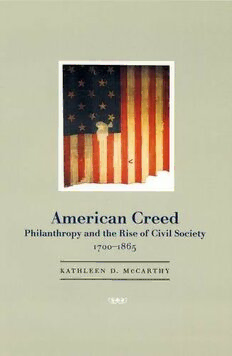
American Creed: Philanthropy and the Rise of Civil Society, 1700-1865 PDF
Preview American Creed: Philanthropy and the Rise of Civil Society, 1700-1865
American Creed American Creed Philanthropy and the Rise of Civil Society ‒ . c The University of Chicago Press Chicago and London D The University ofChicago Press, Chicago The University ofChicago Press, Ltd., London © by The University ofChicago All rights reserved. Published Paperback edition Printed in the United States ofAmerica : ---(cloth) : ---(paperback) Library ofCongress Cataloging-in-Publication Data McCarthy, Kathleen D. American creed : philanthropy and the rise ofcivil society, –/Kathleen D. McCarthy. p. cm. Includes bibliographical references and index. ---(cloth : alk. paper) . Charities—United States—History—th century. . Non- profit organizations—United States—History—th century. . Civil society—United States—History—th century. . Charities—United States—History—th century. . Nonprofit organizations—United States—History—th century. . Civil society—United States—History—th century. I. Title. . .(cid:2)(cid:2)—dc (cid:2)(cid:3) The paper used in this publication meets the minimum requirements ofthe American National Standard for Information Sciences—Permanence ofPaper for Printed Library Materials, .-. To the International Fellows ofthe Center for the Study ofPhilanthropy The Graduate Center City University ofNew York Contents Acknowledgments, ix Introduction, : . Forging the Creed, . The Feminization of Republicanism, . The Legacy of Disestablishment, . The Geography of Generosity, . Race, Religion, and Reform, : . The Jacksonian Backlash, . Civil Society/Civil Disorder, . The Politics of Chivalry, Conclusion: Civil Society and the Civil War, Notes, Bibliography, Index, Acknowledgments One of the happiest tasks in writing a book is thanking the people who helped along the way. I am extremely grateful to everyone who assisted me on this journey. Any historian will tell you how vitally important archivists are to our work. I have benefited greatly from the wisdom and the assistance of the staffs of the Pennsylvania Historical Society, the New-York Historical So- ciety, the New York Public Library, the Schomburg Center for Research in Black Culture, and the American Bible Society, where Mary Cordato was particularly helpful. I especially want to thank Phillip Lapasansky and his outstanding staff at the Library Company of Philadelphia. Their kind- ness, help, and efficiency played a vitally important role in my ability to finish this research. Many colleagues and friends read some or all of the manuscript in various stages of its career, including Kenneth Arnold, Benjamin Barber, Carol Berkin, Martin Burke, Charles Clotfelter, Virginia Hodgkinson, Stanley Katz, Thomas Kessner, Barbara Leopold, Charles William Maynes, Louis Masur, Eugene Miller, Dan Moore, John Morning, James Oakes, Joel Orosz, Colin Palmer, Bhikhu Parekh, Frances Fox Piven, Kathryn Kish Sklar, James Allen Smith, Francis X. Sutton, and Sidney Verba. Their good counsel immeasurably improved the book; any remaining errors of fact or interpretation are entirely my own. I also particularly want to thank ix
